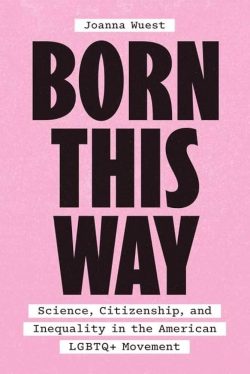On April 3, 2025, a day after crashing the global economy through the unilateral imposition of sweeping tariffs, Donald Trump declared April National Child Abuse Protection Month. The administration, whose head had spent much of his adult life as best friends with Jeffrey Epstein, perhaps the most famous child rapist of the century, declared “the sinister threat of gender ideology” the “most prevalent” form of child abuse in the nation.1Donald J. Trump, “National Child Abuse Prevention Month, 2025,” The White House, April 3, 2025, https://www.whitehouse.gov/presidential-actions/2025/04/national-child-abuse-prevention-month-2025/. He then promised to rid the nation of “transgenderism.” All children are, Trump declared, “perfect exactly the way God made you.”2Trump, “National Child Abuse Prevention Month.” And surely, God made none of them trans. What are we on the left to make of this proclamation? What is the relationship between capitalism and the fight against so-called “gender ideology”? And why would Trump insist that no one is born trans?
Joanna Wuests’s 2023 Born This Way: Science, Citizenship, and Inequality in the American LGBTQ+ Movement gets us quite a ways toward answering these questions. Wuest’s work explores the over seventy-year-long history of the idea that there is something biologically hard-wired that makes us gay or trans. This hypothesis, the author compellingly demonstrates, became a vital tool of class warfare which a well-capitalized, educated elite of “donor-dependent nonprofits, civil rights litigation groups, and well-intentioned self-styled radicals” used to define themselves as the leaders of an ostensibly unified LGBTQ community.3Joanna Wuest, Born This Way: Science, Citizenship, and Inequality in the American LGBTQ+ Movement (University of Chicago Press, 2023), 201. This elite then steered that community towards particularistic reforms that have repeatedly failed to address, and have even exacerbated, economic inequality.4Wuest, Born This Way, 16. Born This Way thus offers a uniquely powerful and interesting answer to the questions why and how queer politics became so central to what Nancy Fraser has aptly termed “progressive neoliberalism.”5Nancy Fraser, The Old Is Dying and the New Cannot Be Born: From Progressive Neoliberalism to Trump and Beyond (New York: Verso, 2019). Wuests’s work is a brilliant and important contribution to queer history and the history of science.
Wuest’s work, however, also represents an ascendent discourse on the social-democratic left that both misunderstands the cause and remedy for fascist attacks on queer life. This way of thinking and organizing views attacks on trans people not as political economic forms of violence in and of themselves (à la Trump’s promise that by banning transgenderism, he will restore the happiness of traditional “parents and families”), but rather as cultural “masks” for unpopular economic agendas.6Joanna Wuest, “The Right Pushes Culture War to Mask its Unpopular Agenda,” Jacobin, March 16, 2025, https://jacobin.com/2024/03/judith-butler-whos-afraid-gender-review. Thus, Wuest rejects many of the foundational critiques offered by queer and social reproduction theory, turning instead to the writings of her mentor Adolph Reed to “expose the class character of identitarianism.”7Wuest, Born this Way, 208. This idea represents a troubling convergence between the social democrats around Jacobin magazine and the right wing of the Democratic Party. Much like Republicans, both blame the ostensibly outsized power of nonprofits and social movements for the electoral failures of the Democratic Party. This left-wing antiwoke interpretation of queer history has real implications, leading, for example, Wuest to set up an ahistorical and unproductive conflict between trade unions and social movements. Worse still, in a moment when social movements’ rights to free speech and assembly are under unprecedented attack, Wuest’s stance leads to rejecting social movements as useful organizing vehicles out of hand.
The Rise of “Born This Way”
Across the twentieth century, different people posited an array of explanations for the emergence and development of homosexuality and transsexuality. Psychoanalysts blamed bad childhoods. Marxist-Leninists sometimes saw queer people as an oppressed nation. Marxian historians preferred to understand the categories as contingent outgrowths of modernity.
It wasn’t until the 1970s, Wuest shows, that “major shifts in political economy and social relations” pushed an increasingly “professionalize[d]” world of gay and lesbian nonprofits to first develop and then wholesale adopt “born this way” framings.8Wuest, Born this Way, 74. Deindustrialization accompanied a “bipartisan reemphasis on the family and the sacred place of the private sphere,” while neoliberals and neoconservatives united in fearmongering over the ostensible threats posted by social welfare policies to “traditional values and ways of life.”9Wuest, Born this Way, 74. Within this context, the notion that sexual attraction was an immutable factor of life, baked into one’s genome, allowed nonprofits and policymakers to argue that gay and lesbian people were a protected category, who could be assimilated into “traditional” formations of social reproduction.
In the 1990s, “born this way” ideology reached an apogee, “grounding gay and lesbian personhood in a nonthreatening logic, rendering queer couples as assimilable rather than a menace.”10Wuest, Born this Way, 138. During the decade, nonprofits definitively shifted from queerness as a set of practices and way of life to an in-built “orientation.”11Wuest, Born this Way, 121. To its advocates, “born this way” thinking proved that queer people were perfectly compatible with capitalism and just needed to be accommodated into the marketplace and public sphere. Yet, as Wuest readily acknowledges, “born this way” did serve an important function, providing at least one class of queer people a means of claiming recognition and taking positions in both the public and private sphere.
As Wuest points out, however, this scientism had many oppressive implications. From the right, the search for a biological basis for queerness has often led to the reinscription of precisely the harmful stereotypes it promised to remedy. Thus, Michael Bailey, the scientist who “discovered” the biological basis of homosexuality in the 1990s, has recently made a name for himself by ostensibly discovering a biological basis for queer people’s disproportionate mental health struggles (thereby helping revive, as Wuest puts it, “one of sexology’s most odious myths”).12Wuest, Born this Way, 199.
The Political Economy of Queerness
More importantly, Wuest contends that “born this way” ideology underwrites dead-end left wing identity politics. Thus, in an article drawn from the second chapter of this work, she indicts the whole New Left and its theorists as having “fundamentally misunderstood” and overestimated “the anti-capitalist potential” of movements advocating for the remaking of sex, gender, and sexuality.13Joanna Wuest, “After Liberation: Sex, Social Movements, and Capital Since the New Left,” Polity 54, no. 3 (July 2022): 481, https://doi.org/10.1086/719830. In parallel with the editorial line of the magazines Jacobin and Catalyst, Wuest contends that New Leftists (and queer liberationists in particular) mistakenly took “capitalism and patriarchy to be tightly bound together” and thus failed to realize that “a capitalist political order appears neither to require nor generate an unwavering mandate for heterosexuality or gender normativity.”14Wuest, “After Liberation,” 481. Instead, Wuest follows John D’Emilio in understanding homosexual identity as emerging as an outgrowth of the “progressive tendencies” of capitalism.15Wuest, “After Liberation,” 482. She also makes this case in Born this Way. Wuest, Born this Way, 127–28. A relaxing of restraints on individuals, together with mass migration into cities and the decreasing power of traditional family structures, led to the emergence of urban “homosexual” communities for the first time in human history.


